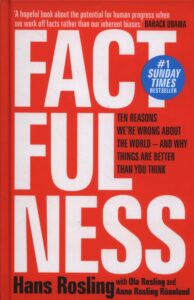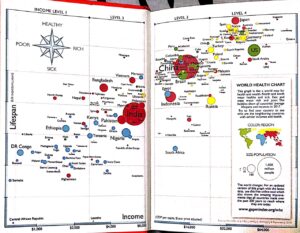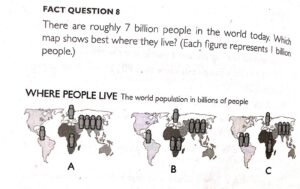
Factfulness, by Hans Rosling, is an attempt to remove age old perceptions from the society. It does so in the most effective way possible – by Data. It is written in a way that is empathetic, yet forces the reader to understand the changing dynamics to enable business decisions. The funny part is it compares human intelligence (rather perception) against Chimps & in most cases, we lose! Just to give a perspective, in a 3 point multiple choice questionnaire, chimps would still have a 33% chance of getting it right & yet we perform worse. Bill Gates recommends this as a must read for all college students. Below is my interpretation of the book –
- Child mortality rate gives much more about a society –
Food, access to primary healthcare, sewage systems leaking into drinking water & mother’s education are some of the factors that influence this KPI of Child mortality rate. Contrary to our belief, the child mortality rate has dropped significantly globally & improvement in above factors represent an overall improvement in society & living standards.
- Gap instinct: The world isn’t really divided into rich & poor now –
Most of the world has moved to middle to high income group. A 4-level income split on lives is what the author suggests (see below illustration). We as humans have the tendency to enhance the “gaps” falling prey to our hunger for dramatics. The gossip isn’t important until dramatized. To control it –

-
- look for majority; avoid averages (there are always overlaps in the spreads of data)
- beware comparisons of extremes
- when you’re at the top, everything looks equally small. Dig deep before forming opinions
- The negativity instinct: The misconception that the world is getting worse –
Since there are multiple improvements that are too slow & fragmented that they don’t qualify as news. Only 9% of human population lives in under $2/day (extreme poverty) now. Again, to feed to our negative instinct, media only publishes the negatives that create a dramatic impact. To control negativity instinct, remember –
-
- it is better AND bad
- good news is not news
- beware of rosy pasts – This also has to do with misremembering. Old people generally romanticise that things ain’t what they used to be. Memory is always a reconstruction
- more news does not equal more suffering – it is a mere repetition of the same instant
- The straight-line instinct: We see all trends in a line of best fit –
World population increase wasn’t a straight line. As more people get out of extreme poverty, they have fewer babies/woman. The balance with nature was earlier made by deaths. Now it is made by choice.
- The fear instinct: critical thinking is always difficult, but it’s impossible when we are scared –
There’s no room for facts when our minds are occupied by fear. We can’t process all the information and hence an attention filter/shield (this is our interest area) is required for selective information processing. But there are holes in the shield that let information that appeals to our dramatic instinct pass. Media houses know exactly this & hence the news that we see. Most fears are because of our evolutionary past of wars, refugee camps & civil uprisings. Fear is also good in the sense that the fear of nukes, chemicals in our food chain has also brought us down to decent level on these for a better life. The only thing that has got worse is terrorism. They truly capitalised on the fear instinct.
How to control the fear instinct?
- Frightening and dangerous are two different things. Risk = danger x exposure. Lastly, get calm before you carry on (easier said than done. TRY)
- The size instinct: never leave numbers (esp large numbers) alone –
Always compare them. E.g. 4.2 MN dead babies in 2016. But in 2015 it 4.4 and in 1950 it was 14.4 MN. Another interesting example is the war memorial sizes in Vietnam. We remember Vietnam war as a huge black spot in world history but the Vietnamese have put this whole size instinct in perspective very aptly. American war memorial was the smallest (3 ft) as the duration of war was 20 years, memorial of freedom from French colonial rule stands at 12 ft whereas the memorial for China war is 300 ft as the war lasted for 2000 years! Now it seems the American war lasted ONLY 20 years!
- World population Pin Code: 1,1,1,4 will change to 1,1,4,5 by 2100 –
This is a very interesting way of putting up the world population chart by the author. The centre of gravity for world market will shift from North Atlantic to Indian Ocean. 11% world population contributes 60% level 4 market. If that is the case, China is definitely investing in the right direction with its BRI (Belt & Road Initiative). This is an indication on where the next business investment should be.
 (The correct answer right now is A)
(The correct answer right now is A)
- The generalisation instinct: everyone automatically categorises and generalises all the time. Unconsciously –
Just because you’ve generalised world population into “they”, you are missing the right consumer segment. E.g. menstrual pads makers in the “west” targeting specialised needs whereas general needs demand has shot up in level 2 & 3 countries.
When seemingly impregnable logic is combined with good intentions, it is almost impossible to spot the generalisation error. E.g. the recovery position on soldiers and infants.
- It is not that poor public hospitals cannot afford paint. Sometimes it is a strategic decision. Flaking walls keep away the rich patients who have special (time consuming) treatment demands. It helps the hospital allocate its limited resources and time to help more number of people.
- The destiny instinct: some cultures, nations, religions will never catch up –
But these are not rocks, they move. Mozambique is where India was 35 years ago. But India has succeeded to level 2 and a reliable trade partner. Mozambique has a long, beautiful coastline on the Indian Ocean , the future centre of global trade. Why should it not prosper?
How to control it? Keep updating your knowledge and be mindful of gradual change (even in your own culture)
- The single perspective instinct: all problems have a single cause or all problems have a single solution –
Your expertise is limited to your area only. Give a child a hammer and everything looks like a nail. Look at the numbers, but not only at the numbers. Numbers support hypothesis, but hypothesis are derived from talking to people. E.g. Mozambique PM judges the prosperity of the nation by watching shoes people wear in the annual parade. If he sees newer, better shoes he is satisfied with the progress!
How to control? Always remember – No single KPI determines improvement. It’s not either/or. It’s both and case by case.
- The blame instinct: we often put blame by assigning reasons for failure –
But remember, “claim” comes as easily as “blame”! It’s not right to simply blame media for portraying the distorted world view as they themselves are human beings with dramatic instinct. Also, they must compete for human attention or risk losing their jobs
- The urgency instinct: now or never can block our roads and our minds –
When we are afraid and under time pressure and thinking of worst case scenarios, we tend to make really stupid decisions. Our ability to think analytically can be overwhelmed by an urge to make quick decisions and take immediate actions
- When big urgent problems arise, first organise the data.
- 5 big problems as forecasted by the author – global pandemic, financial collapse, world war, climate change and extreme poverty
If this intrigues you, please check out author’s website Gapminder for more charts on global trends & facts.
PS – Do take the questionnaire to see how you compare to the Chimps

Like!! Great article post.Really thank you! Really Cool.
Wow that was unusual. I just wrote an extremely long comment but after I clicked submit my comment didn’t show up.
Grrrr… well I’m not writing all that over again. Anyways, just wanted to
say excellent blog!
Here is my homepage … CBD for sale
I in addition to my guys have been viewing the good hints from your website and then all of a sudden came up with a horrible feeling I had not thanked the blog owner for those strategies. All the young boys are already for this reason thrilled to read through them and have in effect extremely been making the most of them. Thanks for actually being simply helpful and then for obtaining certain incredible information most people are really needing to be informed on. My very own sincere regret for not saying thanks to earlier.